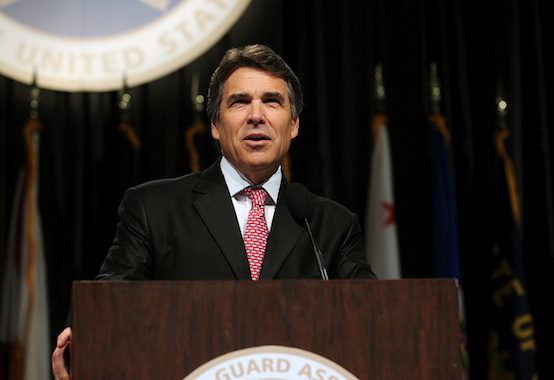Perry’s Reckless Foreign Policy

Former Texas Gov. Rick Perry formally announced his new presidential bid earlier today. Perry’s speech included some unconvincing populist rhetoric and criticisms of corporatism that contradict Perry’s own record of cronyism while governor, and he made gushing promises not to “forget” poor and marginalized citizens that were equally credible. He didn’t spend much time on foreign policy, but what he did say would be worrisome if there were any realistic chance that he could become president.
First, he asserted that America “had won the war” in Iraq by the start of 2009. That isn’t true, and it is a mark of a real Iraq war dead-ender or the most cynical partisan (or both) to claim this. The idea that there was a victory in Iraq that was subsequently squandered is not just shoddy, self-serving history for the party that is most closely identified with the war. It is also a pernicious bit of myth-making that is designed to avoid learning anything from the debacle, and it is an attempt to pin the blame for the war’s disastrous consequences on the people opposed to it. Dominic Tierney recently observed that Americans like to believe that the U.S. should always win the wars that it fights, and that makes the repeated failures in major foreign wars since 1945 difficult to accept or understand. As Andrew Bacevich explains in the current issue of TAC, hawks take advantage of this by inventing convenient, self-congratulatory stories about how the war was won or would have been won if not for the fecklessness of political leaders:
That Vietnam was inarguably a defeat signifying unexpectedly confining limits—a great power unable to beat a bunch of peasants—was something that they and he refused to countenance.
So Reagan told Americans they didn’t have to. Declaring Vietnam a “noble cause” while insisting that if things hadn’t come out quite right it was because the troops weren’t allowed to win, he promised his countrymen a limitless future.
These stories let the hawks off the hook for backing the failed war and open the door to the next unnecessary intervention. Perry made clear that he intended to try to do for the Iraq war what hawks did for Vietnam, which is to recast obvious failure as a victory betrayed. In case there was any doubt about what Perry meant, he made the connection between Iraq and Vietnam explicit:
America had won the war but our president failed to secure the peace. How callous it seems now. Cities once secured with American blood are now being taken by America’s enemies because of a campaign slogan. I saw during Vietnam a war where politicians didn’t keep faith with the sacrifices and courage of America’s fighting men and women. Where men were ordered into combat without the full support of their civilian commanders. To see it happen again 40 years later because of political gamesmanship and dishonesty is a national disgrace.
While paying lip service to unidentified mistakes that people from “both parties” made, Perry wants to make people misremember the Iraq war so that it won’t get in the way of pursuing aggressive policies in the future. The real disgrace here is that Perry is shamelessly rewriting the history of the Iraq war so that more Americans will one day be sent to fight in yet another unnecessary and reckless intervention.
Comments